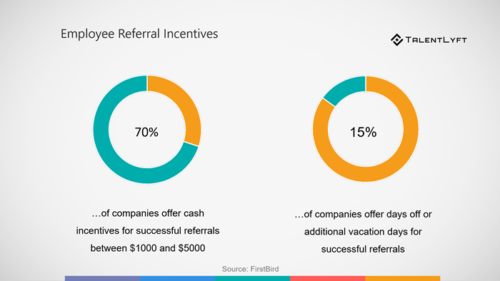3 Simple Steps to Build an Effective Employee Referral Program

A practical and successful employee referral program can be a company’s differentiator to attract the best hires. It can help talent acquisition leaders in cost-effective sourcing and hiring candidates within employees’ networks, speeding up the recruitment process, and mitigating the cost and time spent on each hire.
According to one recent study, close to94% of employees would refer their current company to a friend or acquaintance.
Now imagine what happens when recruiters know how to turn this to their advantage in the employment market.
Keep reading to discover a few ways talent acquisition leaders can build effective employee referral programs toland the best recruits and mitigate overall hiring costs.
1. Incentivize Your Employees for Participating in the Program
Referral incentives are one of the most critical components of an employee referral program.
This motivates a company’s existing employees to refer and help the hiring manager recruit referred candidates from their personal and professional networks. The rewards that employees receive as part of this scheme can make a massive difference in the company’s overall hiring efforts, especially in a job market where the best candidates are gone within ten days .
Today, the most favored and successful referral bonus among employees is monetary.

Source:TalentLyft
Intel is one company that has been using monetary referral bonuses to support its diversity hiring initiative. This American tech giant has implemented a direct incentivizing plan wherein the bonus assigned toward each referral is doubled each time an existing employee successfully refers to a woman or someone from the minority class.
It is also important to remember that different businesses have different preferences and requirements, and what works for one might not necessarily work for the other.
Hence, many companies now offer mixed rewards that incorporate both monetary and non-monetary benefits. Some of these rewards include:
- Cash Reward
A bonus of a certain percentage or a sum of the employee’s income meets specific referring goals set by the HR manager.
- Tiered Reward
Some HR leaders formulate strategies wherein the bonus is divided and distributed during different stages of the recruitment process depending on how many candidates referred by the employee successfully pass.
- Prize Reward
Instead of distributing cash rewards, few companies award prizes such as skill upgrades, talent badges, and additional perks such as free food treats.
- Vacation Reward
Offering additional days off to employees is another widely employed referral bonus reward. In some cases, it could also be a company-sponsored all-expenses-paid vacation.
2. Deploy a Multi-Channel Yet Easy Referral Model
When it comes to creating an effective referral process to attract more participation from the employees’ end, one best practice would be to maintain a proactive approach and keep things as simple as possible so that the referrer does not feel overburdened.
One article explains how the easier you make it for employees to refer, the better the results this strategy will reap for you:
“The ultimate outcome is to design a process that is easy for employees to use and that offers the right mix of rewards to encourage employee participation. Too many restrictions on who in the organization can refer candidates or overly burdensome paperwork for employees to complete may well put a damper on employee participation and the program’s success.”
Talent acquisition leaders should try to establish a clear and concise referral program that spells out all essential requirements. Communicate that the referral will be supported by a reward so that employees don’t feel forced to make a referral.
Having a strategy that supports multiple channels can do wonders for referral programs.
Apart from implementing an online multi-channel referral system, HR leaders can also leverage offline methods such as using template-based forms for collecting referral data. This will make capturing quick responses a lot easier for them.
You need to be willing to mix things up and experiment with different channels to figure out what’s working best for your hiring needs.
Carrying out some industry-wide research, keeping yourself updated on past hiring processes as well as new trends, and identifying how your counterparts are acing referrals can take you a long way in creating a robust multi-channel employee referral strategy.
3. Acknowledge Employees that Get Good Hires Your Way
Lastly, showing appreciation and acknowledging employees for their efforts can take you long to attract more employee referrals in the future.
Share their stories and accomplishments with the rest of the employees and publically thank them for helping you locate, engage, and connect exceptional applicants with the talent acquisition team.
One 2016 report explains how employees are motivated by workplace recognition:
“Workplace recognition motivates, provides a sense of accomplishment, and makes employees feel valued for their work. Recognition not only boosts individual employee engagement but it also has been found to increase productivity and loyalty to the company, leading to higher retention.”
One best practice would be to publish the appreciation in the company’s newsletter describing how the employee aligned his duties with the referral program as his responsibility to enable the uninterrupted functioning of the system.
Talent acquisition leaders should constantly strive to ensure that the referral program is not patched in the company recruitment process but is rather seamlessly induced in the company culture as its active extension.
Start Hiring More Candidates Today
Creating an employee referral program is one way to help your recruiters bring in all kinds of employees. Are you looking for more ways to help your recruiters and hire more candidates?
Recruiter.com has recruiters that you can hire to augment your hiring process, but we also have strong candidate sourcing tools to complement your existing process. Contact us today to learn more!
Get the top recruiting news and insights delivered to your inbox every week. Sign up for the Recruiter Today newsletter.

